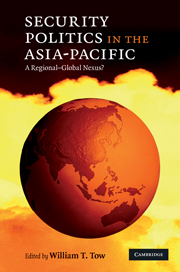Book contents
- Frontmatter
- Contents
- List of illustrations
- About the contributors
- Preface
- Acknowledgements
- List of abbreviations
- 1 Setting the context
- Part I
- Part II
- Part III
- 11 Problematising ‘linkages’ between Southeast Asian and international terrorism
- 12 Nuclear weapons: Asian case studies and global ramifications
- 13 Maritime security: regional concerns and global implications
- 14 Thinking globally and acting regionally: securitising energy and environment
- 15 Regional health and global security: the Asian cradle of pandemic influenza
- Part IV
- References
- Index
11 - Problematising ‘linkages’ between Southeast Asian and international terrorism
Published online by Cambridge University Press: 05 June 2012
- Frontmatter
- Contents
- List of illustrations
- About the contributors
- Preface
- Acknowledgements
- List of abbreviations
- 1 Setting the context
- Part I
- Part II
- Part III
- 11 Problematising ‘linkages’ between Southeast Asian and international terrorism
- 12 Nuclear weapons: Asian case studies and global ramifications
- 13 Maritime security: regional concerns and global implications
- 14 Thinking globally and acting regionally: securitising energy and environment
- 15 Regional health and global security: the Asian cradle of pandemic influenza
- Part IV
- References
- Index
Summary
On 20 September 2001, in response to the terrorist attacks on the United States nine days earlier, President George W. Bush addressed a joint session of the US Congress to explain who had perpetrated the attacks and how his administration would respond. President Bush made clear that ‘(o)ur war on terror begins with al-Qaeda, but it does not end there. It will not end until every terrorist group of global reach has been found, stopped and defeated’ (Bush 2001). Bush described al-Qaeda as ‘a collection of loosely affiliated terrorist organizations’, led by Osama bin Laden, with a network extending to sixty countries. In sum, Bush committed the US to an open-ended global war on terrorism:
Americans should not expect one battle, but a lengthy campaign, unlike any other we have ever seen. It may include dramatic strikes, visible on TV, and covert operations, secret even in success. We will starve terrorists of funding, turn them one against another, drive them from place to place, until there is no refuge or no rest. And we will pursue nations that provide aid or safe haven to terrorism. Every nation, in every region, now has a decision to make. Either you are with us, or you are with the terrorists. From this day forward, any nation that continues to harbor or support terrorism will be regarded by the United States as a hostile regime.
(Bush 2001)- Type
- Chapter
- Information
- Security Politics in the Asia-PacificA Regional-Global Nexus?, pp. 211 - 227Publisher: Cambridge University PressPrint publication year: 2009
- 4
- Cited by

